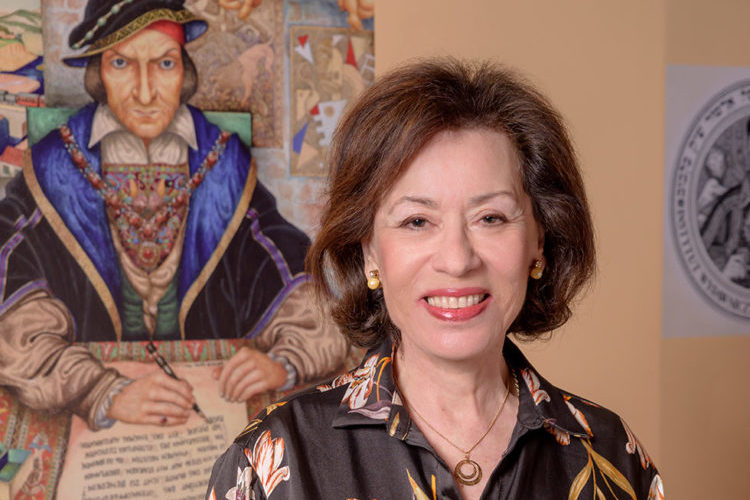The Fass track: Out of retirement to become The Magnes’ new faculty director
Writing books will have to wait for former UC Berkeley history professor Paula Fass as she assumes a new role
May 23, 2019

Paula Fass, who spent 36 years teaching at Berkeley, came out of retirement this month to become the new faculty director at The Magnes Collection of Jewish Life and Art. (Photo by Sibila Savage)
When the powers that be came to Paula Fass to ask her to take over as the faculty director at UC Berkeley’s The Magnes Collection of Jewish Life and Art, it was a bit of a tough sell.
She’d retired in 2010 after 36 years teaching history at UC Berkeley, and while helping to steer the course at the campus’s Jewish archive, library and museum was tempting for the daughter of Holocaust survivors, she was looking forward to writing more books and spending much more time seeing her daughter and son and their families, all on the East Coast.
“Being retired, it was much easier to find the time to see my kids more, so that was a consideration,” Fass says. “And if I took the job, it was likely I wouldn’t be able to write any books for a while. I thought about it very hard.”
And Fass, who has published three books since retiring, thought maybe the job at The Magnes would be better off in someone else’s hands.
“That (outgoing faculty director) George Breslauer even approached me was a bit of a surprise. I thought there were others more qualified,” she says, “But after I was approached, the job seemed more and more appetizing. I wouldn’t have come out of retirement to do this if I didn’t think it was so important.”
Since taking over on May 3, she’s wound her way through a major conference — In Global Transit: Forced Migration of Jews and Other Refugees (1940s-1960s) — while learning the inner workings of the place from the curatorial staff. She’s met with donors and viewed the collection’s photos, paintings, writings, music and more.
“I won’t say I’m overwhelmed, but this is a very different experience from the retirement I had been experiencing,” Fass says. “This is a lush and spectacular collection, and trying to take it in all at once has been breathtaking.”

The Magnes Collection of Jewish Life and Art lured Paula Fass out of retirement. (UC Berkeley photo)
In taking over for Breslauer, Fass is facing some new challenges. Much of the job is about fundraising. She’s never done that, “But I’m ready to learn on the job,” she says.
“Paula has a great personal story to tell and a passion for our story,” Breslauer says. “I think she has a devotion to the mission. I have great confidence in her. I’m passing the reins, but I’m still here as an advisor if she needs that.”
Fass is the daughter of Holocaust survivors Bluma and Harry Fass. Both entered concentration camps with families; both emerged as sole survivors. Born in West Germany in a displaced person’s camp, Fass grew up in New York and taught at Rutgers before making her way to Berkeley four decades ago. Her 2009 book, Inheriting the Holocaust: a Second-Generation Memoir, is an exploration of how the daughter of concentration camp survivors came to understand her world.
She hasn’t spent her entire career in Judaica, however. She’s written about education, immigration and globalization and spent much of her career working on children’s history and children’s policy.
“Being the daughter of Holocaust survivors is a part of me, but not in any overt way,” Fass says. “Coming to The Magnes now gives me the opportunity to join in at a very important moment, when the resurgence of overt anti-Semitic voices is out there.
“The Magnes can become a very important instrument of counteraction to give a better, fuller picture of Jewish life. Judaism is a multiethnic community. There are Jews is India, South America and North Africa. There is a multiculturalism about the Jewish population that the U.S. should know more about. I’d like to give the public a better sense of Jewish life, the vitality and the continuity. Jews have been highly successful in the United States, but wrongfully have been seen as a symbol of colonialism.”
Francesco Spagnolo, curator at The Magnes, says “the time is right” for Fass to be making this move.
“Paula has a fantastic profile as a scholar and as a member of the UC Berkeley community,” Spagnolo, who collaborated with Fass on a lecture at The Magnes in 2017, says. “Because of her passions and her interest, she has a formidable record as a scholar, and her expectations are very good.”
“I’m genuinely looking forward to working with Francesco and with George,” Fass says. “I’m expecting to put a lot of effort and time into learning the ropes, and I know I’ll be able to depend on both of them a lot.”
And she expects to work closely with Chancellor Carol Christ, who was one of the first people Fass met at Berkeley in the mid-1970s.
Fass, with her history in children’s education, says she’d like to see The Magnes become “a spearhead for education.”
“I’d like to take The Magnes out into the schools,” Fass says. “When my son (Charles) was in second grade, he brought me and my family menorah in to (class for me to) explain what it meant in my life. Kids are fascinated with objects. When I passed it around, they were rapt.
“Holding it and hearing the personal stories and seeing the artifacts opened these kids’ eyes. I believe we can reach out and work with others at local museums. I’d like to see a joint effort with the Oakland Museum, say for Black History Month, because there are black Jews.”